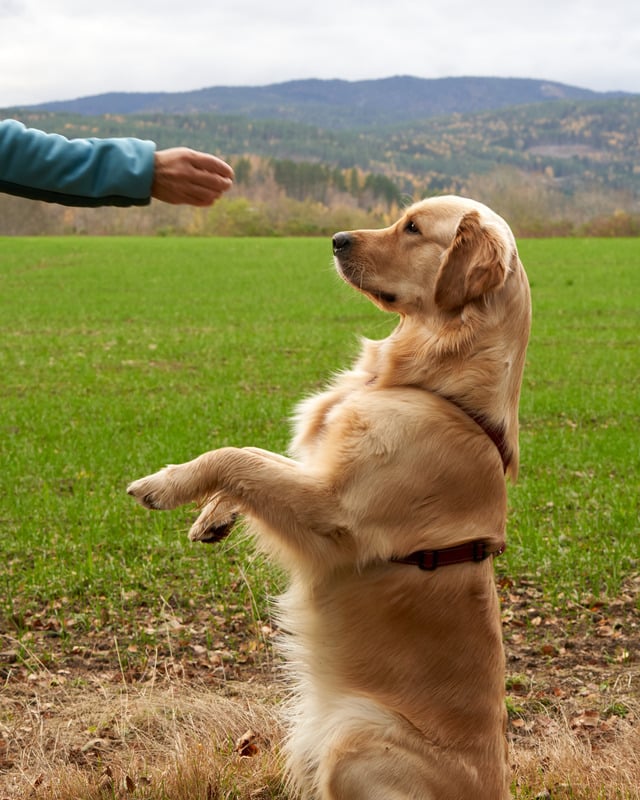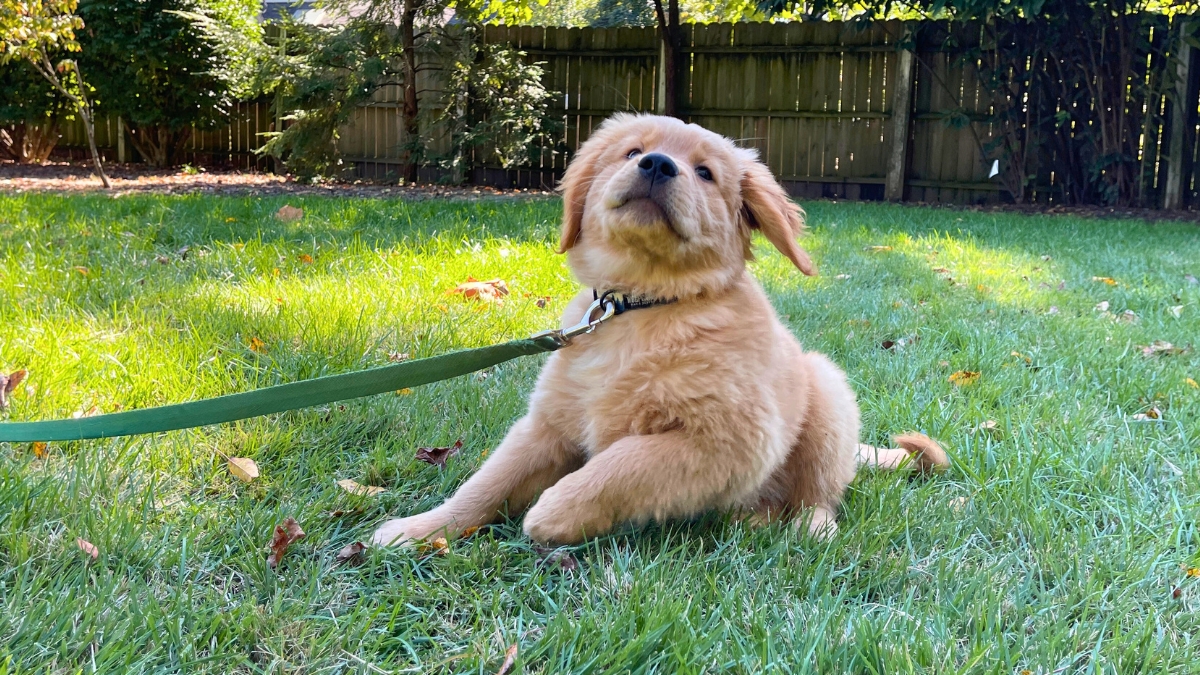Bringing home a Golden Retriever is an exciting experience. They’re loyal, friendly, and full of energy, making them one of the most beloved dog breeds. However, as much joy as they bring, raising a Golden Retriever comes with its challenges.
If you’re not well-prepared, you might make some mistakes that could lead to long-term issues for your pup.
In this post, I’ll share the worst mistakes you can make when raising a Golden Retriever based on my personal experience. By learning from these, you can avoid unnecessary stress and ensure your dog grows up happy and healthy.
- Start training your Golden Retriever as soon as possible to establish good habits early on.
- Socialize your puppy regularly to help them become a well-adjusted adult dog.
- Avoid overfeeding treats and maintain a balanced diet to prevent obesity.
1. Waiting Too Long to Start Training
One of the biggest mistakes I made was waiting too long to start training my Golden Retriever.
I was advised by a friend to give my puppy some freedom to explore the world before starting any formal training. They suggested that training should only begin after six months.
This turned out to be terrible advice.
Why Early Training Matters:
Golden Retrievers are intelligent dogs who thrive on structure. From the moment you bring your puppy home, they are learning and observing everything you do.
If you wait too long to start training, your puppy might pick up bad habits that will be difficult to break later on.
Basic commands like “sit,” “stay,” and “come” should be taught early to help establish good behavior and communication.
Tips for Early Training:
- Start with simple commands: Begin with basic commands as soon as your puppy is comfortable in their new environment. Use positive reinforcement, such as treats and praise, to encourage good behavior.
- Consistency is key: Make sure everyone in the household is on the same page with training methods and commands to avoid confusing your puppy.
- Be patient: Puppies have short attention spans, so keep training sessions short and enjoyable.
2. Not Socializing Your Puppy Enough
Another significant mistake was not socializing my Golden Retriever as much as I should have. While I did make an effort to introduce him to new people and dogs, I didn’t do it consistently or broadly enough.
The Importance of Socialization:
Golden Retrievers are naturally friendly and outgoing, but like all dogs, they need proper socialization to become well-rounded adults.
Socialization involves exposing your puppy to various environments, people, animals, and sounds to help them become confident and unafraid of new experiences.
My dog became comfortable around people and other dogs, but he was terrified of cats and loud noises like car horns because I didn’t expose him to these situations during his critical socialization period.
Effective Socialization Strategies:
- Expose them to different environments: Take your puppy to parks, busy streets, and pet-friendly stores to help them get used to different settings.
- Introduce them to a variety of animals: If possible, arrange safe encounters with other pets, including cats, to prevent fear-based reactions later.
- Positive reinforcement: Reward your puppy with treats and praise during these experiences to create positive associations.
3. Overfeeding Treats
Golden Retrievers are known for their love of food, and their adorable begging eyes can make it hard to resist giving them treats. I fell into this trap and ended up overfeeding my dog, which led to him becoming overweight.
The Risks of Overfeeding Treats:
While treats are a great tool for training, they should be given in moderation. Overfeeding can lead to obesity, which in turn can cause health issues like joint problems, heart disease, and diabetes.
It’s important to remember that treats should only make up about 10% of your dog’s daily caloric intake.
How to Avoid Overfeeding:
- Use small treats: Opt for small, low-calorie treats during training sessions.
- Limit treat intake: Keep track of how many treats your dog is getting each day and adjust their regular meals accordingly.
- Healthy treat options: Consider using fruits and vegetables like carrots or apples as a low-calorie alternative.
4. Not Exercising Your Dog Enough
Golden Retrievers are high-energy dogs who need plenty of physical activity to stay healthy and happy.
I didn’t realize how much exercise my dog actually needed, and as a result, he became restless and developed some undesirable behaviors.
Why Exercise is Crucial:
Without sufficient exercise, Golden Retrievers can become bored and channel their energy into activities like chewing furniture, digging, or excessive barking.
Regular exercise helps to burn off excess energy, reduces anxiety, and keeps your dog physically fit.
Exercise Tips for Golden Retrievers:
- Daily walks: Aim for at least two walks per day, lasting around 30 minutes each.
- Running and swimming: Golden Retrievers love to run and swim. If possible, take them for a run or to a nearby lake or beach for a swim a couple of times a week.
- Interactive play: Engage your dog with games like fetch or tug-of-war to keep them active and mentally stimulated.
5. Feeding Table Scraps
Letting my Golden Retriever eat table scraps was another mistake I made. It started innocently enough, with my dog begging for food while we ate dinner.
His persistence, combined with those irresistible puppy eyes, led to us giving in and feeding him from our plates.
The Dangers of Feeding Table Scraps:
Human food is often too high in calories, salt, and fat for dogs. Regularly feeding your dog table scraps can lead to obesity and other health issues like pancreatitis or digestive problems.
It also encourages begging behavior, which can be difficult to break once it becomes a habit.
How to Stop Feeding Table Scraps:
- Establish boundaries: Make it a rule that your dog isn’t allowed near the dining table during meals. Train them to stay in a specific area while you eat.
- Healthy alternatives: If you want to give your dog a treat, do it in moderation and make sure it’s something healthy that’s safe for them to eat.
- Educate your family: Make sure everyone in the household understands the importance of not feeding the dog table scraps.
6. Not Getting Dog Insurance
One of the mistakes I wish I had avoided was not getting pet insurance early on. Many dog owners, myself included, tend to overlook this, thinking that their dog is healthy and won’t need it.
However, unexpected health issues can arise at any time, and without insurance, you could end up facing expensive vet bills.
Why Pet Insurance is Important:
Golden Retrievers are prone to certain health conditions, such as hip dysplasia and certain types of cancer.
Pet insurance can help cover the costs of treatment, making it easier to provide your dog with the best possible care without breaking the bank.
Choosing the Right Pet Insurance:
- Compare plans: Look for pet insurance that covers a wide range of conditions, including hereditary and congenital issues common in Golden Retrievers.
- Consider the deductible: Choose a plan with a deductible you can afford. Some plans offer higher deductibles with lower premiums, while others have low deductibles but higher monthly costs.
- Read the fine print: Make sure you understand what is and isn’t covered by the insurance plan.
7. Not Researching Enough About the Breed
Finally, one of the most significant mistakes I made was not doing enough research on Golden Retrievers before bringing one home.
Every dog breed is different, and understanding the specific needs of a Golden Retriever is crucial for ensuring they thrive in your home.
Why Research is Essential:
Golden Retrievers were originally bred as working dogs, specifically for retrieving game during hunting. This history affects their behavior, energy levels, and training needs.
By understanding these aspects, you can tailor your care and training approach to suit your dog’s natural instincts and characteristics.
What to Research About Golden Retrievers:
- Breed history and characteristics: Learn about the origins of Golden Retrievers and what makes them unique.
- Common health issues: Research the common health problems associated with Golden Retrievers and how to prevent them.
- Training techniques: Look for training methods that work well with Golden Retrievers, considering their intelligence and energy levels.

Raising a Golden Retriever is a rewarding experience, but it comes with its challenges. Avoiding common mistakes like delaying training, insufficient socialization, and overfeeding treats is crucial.
By also ensuring proper exercise, avoiding table scraps, getting pet insurance, and researching the breed, you can help your Golden Retriever grow into a happy, healthy, and well-behaved dog.
FAQs
1. How soon should I start training my Golden Retriever puppy?
You should start training your Golden Retriever puppy as soon as you bring them home. Early training helps establish good habits and strengthens the bond between you and your dog.
2. How much exercise does a Golden Retriever need?
Golden Retrievers need at least an hour of exercise per day, which can include walks, running, and swimming. Regular exercise helps them stay fit and prevents behavioral issues caused by excess energy.
3. Can I give my Golden Retriever human food as treats?
It’s best to avoid giving your Golden Retriever human food as treats, as it can be too high in calories, salt, and fat. Instead, use healthy dog treats and control their portion sizes.
4. Is pet insurance really necessary for Golden Retrievers?
Yes, pet insurance is highly recommended for Golden Retrievers. They are prone to certain health issues, and having insurance can help cover the costs of treatment, saving you from unexpected financial burdens.
5. What should I know before getting a Golden Retriever?
Before getting a Golden Retriever, research their breed characteristics, common health issues, and specific training needs. Understanding these aspects will help you raise a well-adjusted and healthy dog.
